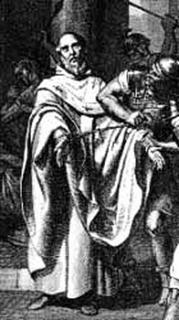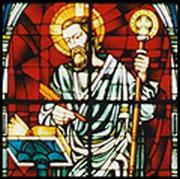
Bishop of Lyons and Defender of Catholic Orthodoxy
Saint Irenaeus was born somewhere around 115 to 125 AD in Asia Minor, where the memory of the Apostles was still cherished, and where there were numerous Christians already. As young man, along with Saint Ignatius of Antioch, he was a disciple of Saint Polycarp of Smyrna, who himself had been a disciple of Saint John the Apostle. Saint Irenaeus once remarked to a friend that all through his life, he could recall every detail of Polycarp's appearance, his voice, and the very words he used when telling what he had heard from John the Evangelist and others who had seen Jesus, because Irenaeus said, they were written on his heart.
There was a vibrant trade between Asia Minor and ancient Gaul, particularly so in Marseilles. With this trade, there also began the arrival of Christian missionaries from Asia Minor who worked to convert the Pagans of Gaul. Saint Polycarp sent Saint Pothinus to Gaul, who established his See at Lyons. Still a young man, Irenaeus joined Pothinus as a priest., and in 177 AD, after having shown himself to be an exceptional priest, he was sent on a peace mission to Rome, bearing a letter to Pope Eleutherius in reference to the Montanists (some sources say it was to deal firmly with the Montanists and others say it was to encourage leniency towards them) in Phrygia, as this heresy was rampant in the East.
During his trip to Rome, there was a persecution of the Church in Gaul in 177 under the pagan “philosopher emperor”, Marcus Aurelius, and Saint Pothinus, as well as several priests in Gaul were martyred. Saint Irenaeus was ordained as bishop of Lyons upon his return. That brief period of persecutions was over, and the next twenty or so years of his episcopate were fairly peaceful. In addition to his pastoral duties, Irenaeus is said to have increased the sphere of Christian influence in other towns of Gaul by sending Saint Felix, Saint Fortunatus, and Saint Achilleus to Valence, and sending Saint Ferrutius and Saint Ferreolus to Besancon. Saint Irenaeus is said to have identified with his flock so completely, that he spoke to them in their native tongue instead of in Latin or Greek, and he encouraged all priests to do the same.
In later years, he encouraged Pope Victor I to lift his excommunication of Churches in the East because of disagreement over the correct date of Easter. The Eastern Churches tended to follow the Jewish calendar in their observance of Easter instead of the date followed by Rome. In his letter to Pope Victor I, Irenaeus pointed out that the Eastern Churches were following their Apostolic tradition, and that this point, had not prevented Saint Polycarp and many other Eastern bishops from staying in communion. It must have been a fruitful letter, because in the 4th century, Saint Jerome wrote that many of the Eastern bishops still followed the ancient Jewish calendar.
Yet, the thing that Saint Irenaeus is best remembered for, is his defense of the Catholic Faith against the heresy of Gnosticism, which was spreading rapidly throughout Gaul, and even into Rome. This led Irenaeus to make a careful study of the tenets of Gnosticism, which was quite a task in itself, because each Gnostic teacher was inclined to introduce ideas of their own. He then wrote a five book exposition, “Against the Heresies”, which set forth the doctrines of Gnosticism, and then contrasted them with Scripture, and the teaching of the Apostles preserved not only in the sacred writings, but, also the oral tradition in the churches which the Apostles founded. Saint Irenaeus successfully defended the belief that the Old Testament God and the New Testament God are one and the same.
Interestingly, Irenaeus apologized for his writing style and ability at the beginning of his piece. He wrote in part, “thou wilt not expect from me, who am resident among the Keltæ, and am accustomed for the most part to use a barbarous dialect, any display of rhetoric, which I have never learned, or any excellence of composition, which I have never practised, or any beauty and persuasiveness of style, to which I make no pretensions. But thou wilt accept in a kindly spirit what I in a like spirit write to thee simply, truthfully, and in my own homely way...so that thou wilt expand those ideas of which I send thee...so as to set with power before thy companions those things which I have uttered in weakness”. What Saint Irenaeus didn't realize, is that his writing of “Against the Heresies”, was so thorough and complete, that it would deal such a severe blow to Gnosticism, that it would never again be seen as a serious major threat to the tenets of Christianity.
Saint Irenaeus felt that most of the attraction of Gnosticism came from a veil of mystery which surrounded it, and he was determined to “strip the fox” as he called it. He effectively used Scripture, and particularly the writings and teachings of Paul, Peter, and John to effectively refute the tenets of Gnosticism and destroyed it's influence on Christianity. Saint Irenaeus was the first early writer to effectively utilize the Gospel of Saint John in his writings. He recognized the warnings from Our Lord, Saint Paul, Saint Peter, Saint Jude, and Saint John about false teachers, and wolves in sheep's clothing. He recognized that the false claims of special or secret knowledge claimed by Gnosticism was a serious threat to Christianity, and was an attempt at the revival of Paganism. He was also the first person to cite reasons for admitting or rejecting books into the canon. He emphasized the unity of the Old and New Testaments, and Christ's having both a divine and a human nature.
He wrote his treatise in Greek, and it was quickly translated into Latin, and rapidly spread throughout the Church. Irenaeus' main point was the unity of God, in opposition to Gnosticism's view of a division of God into 30 divine “Aeons” and their heretical perception of a “high God” and a wicked “Demiurge” that they said created the world. Irenaeus spoke of the Son and the Holy Spirit as the hands of God, and showed that Jesus Christ is the invisible Father made visible. He showed that God was not indifferent to His creation, but, that He has taken an active role in the salvation of man. Everything that has happened to man since the fall of Adam and Eve, has been planned by God to help man overcome their fall. Irenaeus shows in his writings, that Christ is the new Adam, who corrected everything wrong that Adam did. Irenaeus is the first to contrast the differences between Eve and Mary, showing how Mary's faithfulness was in opposition to Eve's faithlessness.
In essence, what Irenaeus did through “Against Heresies”, was layout the truth of Catholic Christian theology, and then in his later writing, "Proof of the Apostolic Preaching", he confirms the faithful by explaining Christian doctrine to them, and also by demonstrating the truth of the Gospel through explaining and clarifying the Old Testament prophecies. Saint Irenaeus was one of the first Christian writers to use the principle of apostolic succession to refute his opponents.
Saint Irenaeus is believed to have been martyred by some sources, others saying there is little evidence to support his martyrdom. The exact date of his death is unknown, but, it's believed to have been around 202 AD. His remains were buried in a crypt under the altar of what was then called the church of Saint John, but, was later known as the church of Saint Irenaeus, himself. This tomb or shrine was destroyed by the Calvinists in 1562, and all trace of his relics seems to have perished, but, the head is said by some sources to be in Saint John's church, Lyons, France.
You can read “Against Heresies” online, and there is a book, “Scandal of the Incarnation: Irenaeus against the Heresies” by Saint Irenaeus, John Saward (translator), Hans U. Von Balthasar (introduction).
Below are some quotes from Saint Irenaeus of Lyons, and at the bottom, a writing about him from Saint Jerome's “Lives of Illustrious Men”:
1. For this is why the Word became man, and the Son of God became the Son of man: so that man, by entering into communion with the Word and thus receiving divine sonship, might become a son of God.
2. God is the source of all activity throughout creation. He cannot be seen or described in his own nature and in all his greatness by any of his creatures. Yet he is certainly not unknown. Through his Word the whole creation learns that there is one God the Father, who holds all things together and gives them their being. As it is written in the Gospel, "No man has ever seen God, except the only-begotten Son, who is in the bosom of the Father; he has revealed him."
3. This is the course followed by the barbarian peoples[the Gallic provincials where Irenaeus lived] who believe in Christ and have salvation written in their hearts by the Spirit without paper or ink, but who guard carefully the ancient tradition. For they believe in one God, the Creator of heaven and earth and of all things therein through Christ Jesus, the Son of God, who for his surpassing love towards his creation underwent birth from a virgin, uniting man through himself to God, and who suffered under Pontius Pilate and rose again and was received up in splendor, and who shall come in glory, the Saviour of those who are saved and the Judge of those who are judged, to send into eternal fire those who pervert the truth and despise his Father and his coming.
4. Error, indeed is never set forth in its naked deformity, lest, being thus exposed, it should at once be detected. But it is craftily decked out in an attractive dress, so as, by its outward form, to make it appear to the inexperienced more true than truth itself.
Irenaeus, a presbyter trader Pothinus the bishop who ruled the church of Lyons in Gaul, being sent to Rome as legate by the martyrs of Ibis place, on account of certain ecclesiastical questions, presented to Bishop Eleutherius certain letters under his own name which are worthy of honour. Afterwards when Pothinus, nearly ninety years of age, received the crown of martyrdom for Christ, he was put in his place. It is certain too that he was a disciple of Polycarp, the priest and martyr, whom we mentioned above. He wrote five books Against heresies and a short volume, Against the nations and another On discipline, a letter to Marcianus his brother On apostolical preaching, a book of Various treatises; also to Blastus, On schism, to Florinus On monarchy or That God is not the author of evil, also an excellent Commentary on the Ogdoad at the end of which indicating that he was near the apostolic period he wrote:
"I adjure thee whosoever shall transcribe this book, by our Lord Jesus Christ and by his glorious advent at which He shall judge the quick and the dead, that you diligently compare, after you have transcribed, and amend it according to the copy from which you have transcribed it and also that you shall similarly transcribe this adjuration as you find it in your pattern."
Other works of his are in circulation to wit: to Victor the Roman bishop On the Paschal controversy in which he warns him not lightly to break the unity of the fraternity, if indeed Victor believed that the many bishops of Asia and the East, who with the Jews celebrated the passover, on the fourteenth day of the new moon, were to be condemned. But even those who differed from them did not support Victor in his opinion. He flourished chiefly in the reign of the Emperor Commodus, who succeeded Marcus Antoninus Verus in power.
Copyright © 2005 Steve Smith. All Rights Reserved



